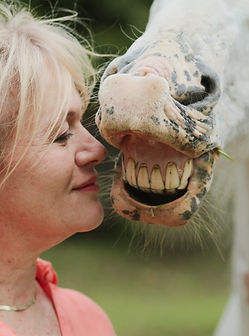Equine Assisted Psychotherapy is a healing modality that combines qualified mental health professionals and one or more therapeutic horses. Through grooming, leading or just being with the horse, clients are supported and guided in learning more about themselves, working through difficulties, and improving communication and relationship skills.
Equine Assisted Psychotherapy can be practised with individuals, couples or groups.
We work with horses because:
Horses Respond to Human Emotions
Horses are highly attuned to non-verbal cues and can sense emotions such as stress, fear, or calmness. This makes them incredible partners in therapy, as their responses can help individuals recognise and process their feelings in real-time.
Boosts Emotional Regulation and Confidence
Working with horses requires patience, focus, and clear communication, helping individuals develop emotional regulation and self-confidence. Activities like grooming, leading, or simply being present with a horse can have therapeutic benefits for anxiety, trauma, and self-esteem.
Nature’s Healing Environment
Equine-assisted therapy often takes place outdoors, combining the therapeutic power of nature with the calming presence of horses. Being in a natural setting helps to reduce stress, improve mental clarity, and foster a sense of well-being.
EAP is an integrated approach incorporating Equine Assisted Therapy, counselling, Gestalt therapy, mindfulness practices and horsemanship.
There is a growing body of evidence that supports that EAP has been effective in treating:
-
Post-Traumatic Stress Disorder (PTSD)
-
Eating disorders
-
Bullying
-
Substance abuse and addictions
-
Depression and anxiety
-
Stress
-
Autism
-
ADD and ADHD
-
Relationship difficulties
-
Attachment issues
-
Low self-esteem
-
Negative behavioural issues
-
Communication difficulties
Equine Assisted Therapy can also still be accessed through the NDIS as per the attached information. The provisions are that it must:
1. Be delivered by a qualified allied health professional
2. Forms part of a structured program with therapeutic goals
3. Aligns with one or more of your NDIS goals
4. Is considered reasonable and necessary.
As a Masters qualified Creative Arts Therapist I can offer clients Art Therapy sessions alongside Equine Assisted Therapy, the balance of which depends on your clients needs/abilities.








